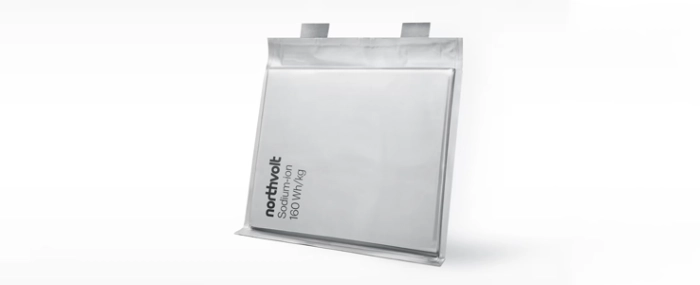
Northvolt develops sodium-ion battery
Swedish battery manufacturer Northvolt says it reached a breakthrough in the development of a sodium-ion battery, something that could minimise the dependence on long supply chains.
Northvolt'a sodium-ion battery has been developed for the expansion of cost-efficient and sustainable energy storage systems globally. The cell has been validated for an energy density of over 160 watt-hours per kilogram at the company’s R&D and industrialisation campus in Västerås, Sweden.
Northvolt’s says that the cell is safer, cost-effective, and more sustainable than conventional nickel, manganese and cobalt (NMC) or iron phosphate (LFP) chemistries and is produced with minerals such as iron and sodium that are abundant on global markets.
It is based on a hard carbon anode and a Prussian White-based cathode, and is free from lithium, nickel, cobalt and graphite. Northvolt states further that the company plans to be the first to industrialise Prussian White-based batteries and bring them to commercial markets.
“The world has put high hopes on sodium-ion, and I’m very pleased to say that we’ve developed a technology that will enable its widespread deployment to accelerate the energy transition. It’s an important milestone for Northvolt’s market proposition, but battery technology like this is also crucial to reach global sustainability goals, by making electrification more cost-efficient, sustainable and accessible worldwide,” says Peter Carlsson, CEO and Co-Founder of Northvolt, in a press release.
The sodium-ion technology – which has been developed together with research partner Altris – is intended to provide the foundation for Northvolt's next-generation energy storage solutions. The low cost and safety at high temperatures make the technology especially attractive for energy storage solutions in upcoming markets including India, the Middle East and Africa.
The technology can also be produced with locally sourced materials, providing a pathway for developing new regional battery manufacturing capacity – entirely independent of traditional battery value chains.
“Our sodium-ion technology delivers the performance required to enable energy storage with longer duration than alternative battery chemistries, at a lower cost, thereby opening new pathways to deploying renewable power generation. The potential of sodium-ion in this market alone will make a tremendous impact in the drive towards global electrification,” Peter Carlsson concludes.


